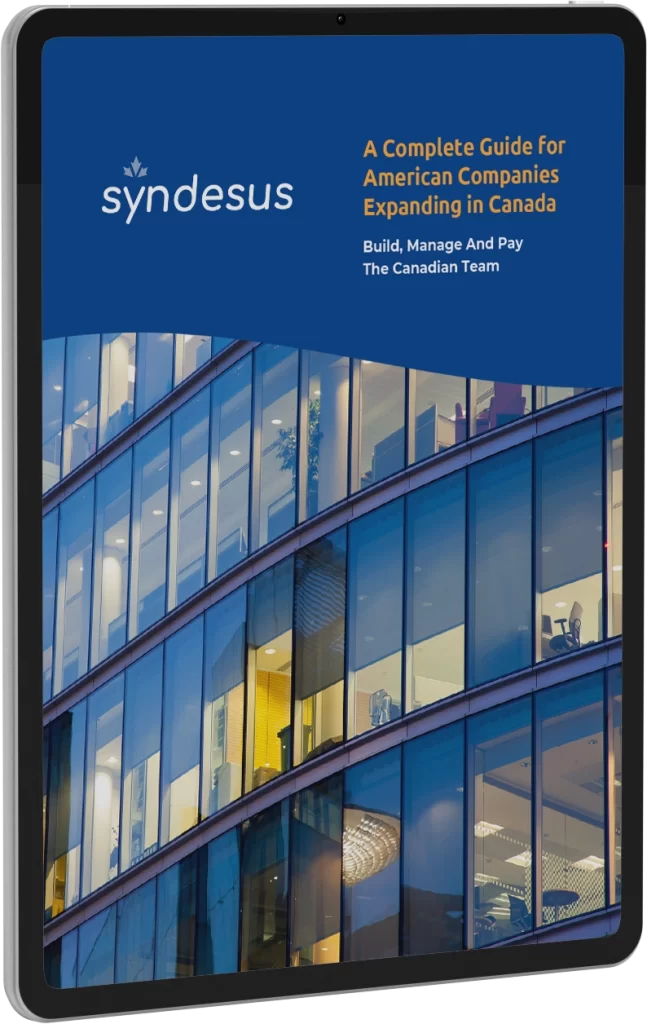In today’s digital world, the dream of working across borders is easier to achieve than ever before. For many Canadians, working for a U.S.-based company is an exciting opportunity that offers competitive salaries, new experiences, and professional growth. However, why Canadian contractors for U.S. companies need an EOR becomes clear when considering the legal and administrative challenges that come with cross-border employment, despite the proximity of the U.S. and Canada.
One key solution to these challenges, particularly those related to Canadian employment law, is the use of an Employer of Record (EOR). But what exactly is an Employer of Record, and why is it so important for Canadian contractors working for U.S. companies? Let’s break it down.
What is an Employer of Record (EOR)?
An Employer of Record is a third-party organization that acts as the legal employer, taking on the legal responsibilities of employing workers on behalf of a company. In simpler terms, they act as the official employer for payroll, taxes, and compliance purposes, even though the contractor works for another business.
For example, if you’re a Canadian contractor working for a U.S. company, the Employer of Record handles everything related to your employment, such as paying your wages, withholding taxes, and ensuring all legal requirements are met.
Why Can’t U.S. Companies Directly Employ Canadian Contractors?
At first glance, it might seem simple for a U.S. company to hire Canadian employees as contractors. After all, both countries have strong economic ties and share a border. However, the reality is more complicated due to the following reasons:
1. Cross-border Taxation
When a U.S. company hires a Canadian contractor, it triggers complex tax issues in both countries. Without proper handling, both the company and the contractor could end up paying unnecessary taxes or face penalties for non-compliance. An EOR ensures that all payroll and tax obligations are properly managed, helping the contractor avoid double taxation and ensuring compliance with Canadian and U.S. tax laws.
2. Canadian Employment Laws
Labor laws in Canada and the U.S. are different. Each province in Canada has its own set of rules for things like minimum wage, overtime, vacation pay, and Canada employment contracts. U.S. companies may not be familiar with these provincial regulations. An Employer of Record is well-versed in both Canadian labor laws and the rules that apply to U.S. companies, making sure that contractors are treated fairly and are protected under the law.
3. Legal Compliance
For a U.S. company to hire a Canadian contractor directly, they might need to set up a legal entity in Canada, which can be time-consuming and costly. In most cases, it’s not worth the hassle for a U.S. company to establish a Canadian presence just to hire a contractor. An EOR provides a simpler solution by legally employing the Canadian contractor on behalf of the U.S. company, without the need for a legal entity in Canada. Additionally, Canadian laws encourage employers to focus on employee development and address performance issues rather than resorting to termination.
4. Simplified Payroll Management and Payroll Taxes
Paying employees or contractors in a different country comes with its own set of challenges, especially when you hire employees through an Employer of Record. Canadian contractors are paid in Canadian dollars, while U.S. companies typically deal in U.S. dollars. An EOR ensures that payroll is managed efficiently, converting currencies and handling any additional fees associated with international payments. Additionally, they ensure that payments are made on time, every time, while also handling deductions for taxes, benefits, and more.
Key Benefits of Using an Employer of Record for Canadian Contractors
Now that we’ve covered why U.S. companies might need an Employer of Record for hiring employees to hire Canadian contractors, let’s talk about the benefits for contractors themselves.
1. Ensures Tax Compliance
One of the biggest concerns for cross-border workers is managing taxes in two countries. Canadian contractors working for U.S. companies need to navigate both the Canada Revenue Agency (CRA) and the U.S. Internal Revenue Service (IRS). Without an Employer of Record, it’s easy to get lost in the paperwork and regulations. An EOR simplifies this process by making sure that taxes are correctly withheld, reported, and paid, preventing any unpleasant surprises when tax season rolls around.
2. Access to Employee Benefits
Even though contractors typically don’t receive the same benefits as full-time employees, an EOR can offer options for benefits like health insurance, retirement savings plans, and paid time off. This is especially helpful for Canadian contractors who may not otherwise have access to these benefits while working for a U.S.-based company. It’s a great way to get some extra security and peace of mind while still enjoying the flexibility of contract work.
3. Legal Protection
When working across borders, it’s essential to ensure that all legal requirements are met. If a U.S. company hires a Canadian contractor directly, they may overlook important legal obligations, leaving the contractor vulnerable. An EOR ensures that everything is handled according to Canadian law, from employment contracts to workers’ rights, offering additional protection to contractors.
4. Peace of Mind
Working for a foreign company can be stressful, especially when it comes to dealing with taxes, compliance, and payroll. An Employer of Record takes care of the heavy lifting, allowing Canadian contractors to focus on their work without worrying about the complexities of cross-border employment. This makes the whole experience smoother and more enjoyable.
Risks of Employee Misclassification in Canada
1. Consequences of Misclassification
Misclassifying employees as independent contractors in Canada can lead to significant repercussions for employers. If an employee is incorrectly classified, the employer may be held accountable for unpaid employment insurance, Canada Pension Plan contributions, and income taxes. Beyond these financial liabilities, the employer could face penalties and fines for non-compliance with Canadian employment laws. Misclassification can also result in disputes with employees, tarnishing the employer’s reputation and leading to increased legal costs for defending against potential lawsuits. Ensuring proper classification is not just a legal obligation but a critical step in maintaining a trustworthy and compliant business operation.
2. Importance of Proper Classification
Proper classification of workers is essential to comply with Canadian employment laws and regulations. Employers must distinguish between employees and independent contractors accurately, using criteria such as the control test, the integration test, and the economic reality test. Understanding these tests helps in determining the correct status of a worker. Employers should also be proactive in preventing misclassification by conducting regular audits and seeking professional advice. Proper classification ensures that all legal obligations are met, protecting the business from potential legal and financial risks associated with misclassification.
Choosing an Employer of Record in Canada
Key Considerations for Selecting an EOR
When selecting an Employer of Record (EOR) in Canada, several critical factors should be considered to ensure a smooth and compliant employment process:
- Compliance with Canadian Employment Laws: Ensure the EOR is well-versed in Canadian employment laws, including those related to employment contracts, payroll taxes, and employee benefits. This knowledge is crucial for maintaining compliance and avoiding legal issues.
- Experience Working with Canadian Employees: Choose an EOR with a proven track record of working with Canadian employees. Their experience and understanding of the local labor market can be invaluable.
- Ability to Handle Payroll and Benefits: The EOR should efficiently manage payroll and benefits administration, including compliance with employment insurance, Canada Pension Plan contributions, and income taxes. This ensures that employees receive their entitlements without any hitches.
- Professional Employer Organization (PEO) Services: Consider an EOR that offers PEO services for additional support and guidance on employment-related matters. This can be particularly beneficial for navigating complex employment issues.
- Health Insurance and Statutory Benefits: Verify that the EOR can provide health insurance and statutory benefits to Canadian employees as required by law. This is essential for meeting legal obligations and ensuring employee satisfaction.
- Independent Contractor Management: If hiring independent contractors, ensure the EOR can manage their contracts and ensure compliance with Canadian laws and regulations. Proper management of independent contractors is crucial to avoid misclassification issues.
- Local Labor Laws and Regulations: The EOR should be familiar with local labor laws and regulations in Canada, including those related to hiring, firing, and employee rights. This knowledge helps in maintaining compliance and protecting the business from legal risks.
- Reputation and Customer Service: Research the EOR’s reputation and customer service record. A reliable and responsive EOR can make a significant difference in managing your workforce effectively.
By considering these factors, you can select an EOR that meets your needs and helps you navigate the complexities of hiring and managing employees in Canada.
How Does an Employer of Record Work?
So, how exactly does an Employer of Record facilitate the relationship between a U.S. company and a Canadian contractor?
Let’s say you’ve been hired as a contractor by a U.S. company, but instead of the company directly handling your employment, they engage an EOR. The EOR will take care of all the administrative aspects of your employment, including:
- Onboarding: Ensuring you have the necessary paperwork and contracts in place.
- Payroll: Paying your salary or wages, converting between currencies if necessary.
- Taxes: Withholding and remitting the appropriate taxes to the CRA and any applicable U.S. tax authorities.
- Compliance: Ensuring that the company follows Canadian labor laws.
The U.S. company benefits by avoiding the administrative burden of cross-border employment, and you, the contractor, get paid seamlessly, with taxes and legal requirements taken care of.
Why You Need an EOR If You’re a Canadian Contractor
If you’re a Canadian contractor considering working for a U.S. company, an Employer of Record can make your life a lot easier. Without an EOR, you’ll be responsible for handling the legal, tax, and compliance aspects of your employment, which can be overwhelming. Using an EOR takes away these headaches, allowing you to focus on your job without the added stress of navigating international employment rules.
Additionally, U.S. companies often prefer to work with contractors through an EOR because it reduces their risk. This makes it more likely that you’ll secure the job, as the company won’t have to worry about setting up operations in Canada or accidentally violating Canadian labor laws.
Conclusion
Working for a U.S.-based company as a Canadian contractor can be an exciting and rewarding experience, but it does come with its challenges. An Employer of Record is a vital tool for simplifying cross-border employment, ensuring tax and legal compliance, and giving both contractors and companies peace of mind.
Whether you’re a contractor looking to expand your opportunities or a company hoping to tap into Canadian talent, Syndesus can bridge the gap between the U.S. and Canada, making cross-border work more accessible and straightforward.
To find out more about how Syndesus can help you recruit Canadian remote workers and employ them legally and safely, request a free consultation today.

